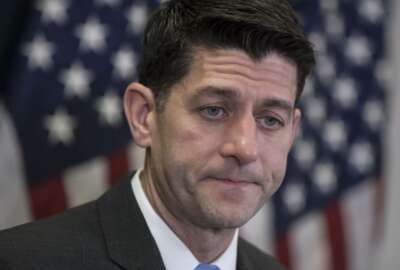
Omnibus spending bill complicates administration’s reorg plans
The $1.3 trillion omnibus spending package includes all 12 appropriations bills and conforms to the new, higher spending caps set in the 2018 Bipartisan Budget Act.
Best listening experience is on Chrome, Firefox or Safari. Subscribe to Federal Drive’s daily audio interviews on Apple Podcasts or PodcastOne.
The House passed a $1.3 trillion omnibus spending package Thursday afternoon, the first of a series of crucial steps to avoid a third government shutdown in fiscal 2018.
Senate Majority Leader Mitch McConnell (R-Ky.) filed cloture on the spending bill late Thursday afternoon. If senators agree to end debate on the bill, they can move forward with a vote. But if there’s disagreement — like there was at the last minute deadline for the previous continuing resolution — Saturday at midnight is the earliest senators can end debate and conduct final votes on the omnibus.
The current continuing resolution expires Friday.
The president has signaled that he would sign the spending bill. But as the Trump administration has indicated, the omnibus clearly does not fulfill all of POTUS’ priorities.
“A strong military and secure border are the centerpieces of the administration’s efforts to keep the nation safe,” the White House said in its statement of administrative policy. “[The omnibus], the product of negotiation and compromise, includes wasteful spending increases in order to secure bipartisan support.”
The omnibus includes all 12 appropriations bills and conforms to the new spending caps set in the Bipartisan Budget Act of 2018, which Congress passed last month.
Tucked in the 2,232-page omnibus spending bill is a provision that adds another layer of complication to the Trump administration’s reorganization initiatives. According to the omnibus, agencies cannot simply cut or eliminate a specific program or office unless Congress has authorized the move in an appropriations bill.
“None of the funds made available in this or any other appropriations Act may be used to increase, eliminate, or reduce funding for a program, project, or activity as proposed in the president’s budget request for a fiscal year until such proposed change is subsequently enacted in an appropriation act, or unless such change is made pursuant to the reprogramming or transfer provisions of this or any other appropriations act,” the 2018 spending bill reads.
Though many agencies’ reorganization plans will eventually require congressional action, the 2018 omnibus slows departments from cutting whole offices or programs immediately on their own without congressional approval.
Civilian agencies are generally spared from the deep spending cuts the president’s 2018 and 2019 budget proposals originally suggested. Even agencies such as the Environmental Protection Agency will see its budget frozen for the remainder of the fiscal year.
Pay and workforce provisions
The 2018 omnibus does not change the 1.9 percent average pay raise the president finalized at the end of 2017 for most civilian employees. Military members will receive a 2.4 percent pay raise.
“Some of the best news for federal employees is what is not in the omnibus,” National Treasury Employees Union President Tony Reardon said in a statement. “No cuts in compensation, and no rolling back of due process that ensures front line employees aren’t subject to arbitrary and unfair retaliation and favoritism. The nation’s merit-based civil service is the world’s premiere public workforce and in this healthy economy, we will encourage Congress to take the next step and provide a 3 percent pay increase for federal employees in 2019.”
But the bill does continue a 2013 pay freeze for the vice president and other senior political appointees and limits pay for prevailing rate employees. Non-career appointees in the Senior Executive Service, limited term appointees, limited term emergency appointees in the SES serving under a political appointment and employees at or above Executive Schedule level 4 who receive basic rates of pay will generally not see a raise, the budget said.
The spending bill also includes a bevy of other provisions.
For example, one prevents agencies from prohibiting their employees from communicating with members of Congress, staff or individual committees and subcommittees. In addition, agencies cannot take disciplinary action against employees who do communicate with Congress.
Some agencies over the past year have implemented policies that prevented employees from communicating with Congress or from responding to information requests from ranking members of committees, much to ire of oversight and advocacy organizations.
The budget also includes a few other, notable comments geared toward labor unions. For example, the omnibus clarifies the definition of official time: “An employee of an agency shall use official time in an honest effort to perform official duties,” the legislation reads. The budget also prohibits agencies from providing employees’ home address to labor organizations without specific authorization.
Another provision prevents agencies from monitoring their employees’ internet use at federal offices.
Agencies have specific requirements to send detailed reports to their organization’s inspector general about official travel and conference spending.
Another unique and topical provision prevents agency heads from spending more than $5,000 to redecorate their office or executive suite during the time they hold a politically appointed office — without giving advance notice to congressional committees.
In addition, the Office of Personnel Management will receive $21 million through the end of fiscal 2019 for its IT modernization and cybersecurity efforts.
Appropriations committees cited the Government Accountability Office’s 80 recommendations on OPM cybersecurity. “To date, OPM has not implemented the vast majority of these recommendations,” the appropriators report on the omnibus reads. “OPM is expected to take the steps necessary to complete outstanding GAO recommendations to improve its information security.”
OPM must give congressional appropriators quarterly updates describing its progress to improve network security and infrastructure. The agency must work with the Homeland Security Department and U.S. Digital Service on this improvement plan, and the OPM inspector general will also review and comment on it.
Veterans
The Veterans Affairs Department will, once again, receive an unprecedented budget boost for the remainder of fiscal 2018.
VA’s $81.5 billion budget will fund mental health services for veterans with less-than-honorable discharges, a priority that Secretary David Shulkin has touted over the past year.
The budget also creates a new account to fund the department’s new electronic health record. The fund will get $782 million to pay for the project and monitor spending associated with the Cerner contract.
But the omnibus does not include the three new, highly anticipated policies that some members of Congress had advocated. House Veterans Affairs Committee Chairman Phil Roe (R-Tenn.) had struck a deal with Senate VA Committee Chairman Johnny Iskason (R-Ga.) and Ranking Member Jon Tester (D-Mont.) to attach three major proposals to the bill: a plan to consolidate VA’s community care programs into one, integrated network; a systematic review of VA’s aging infrastructure and facilities; and an expansion of the department’s caregiver assistance program.
But the deal fell through, leaving Congress, once again, without agreement on a permanent path forward for the Veterans Choice Program.
Homeland security
The omnibus also includes nearly $1.6 billion for the construction of a wall and related technology along the U.S.-Mexico border. It is significantly less than the administration’s request, which ranged from $33 billion to $38 billion.
Broadly, the Homeland Security Department will see a $6.3 billion budget boost over 2017’s level. Customs and Border Protection will get more resources to better recruit and retain border patrol agents. The omnibus funds the hiring of an additional 328 CBP officers for ports of entry and supports the frontline staff whom the agency projects will be on board this fiscal year.
The National Protection and Program Directorate will receive $93 million more over the previous year to support cybersecurity initiatives on civilian federal networks.
The omnibus does not support the administration’s proposed cuts to state and local grants and emergency management personnel.
Most other DHS subcomponents, including those that had been targeted for budget cuts under the president’s request, will receive more resources in 2018. The Transportation Security Administration, however, is one of the few subcomponents that will experience budget cuts this year.
Copyright © 2025 Federal News Network. All rights reserved. This website is not intended for users located within the European Economic Area.
Nicole Ogrysko is a reporter for Federal News Network focusing on the federal workforce and federal pay and benefits.
Follow @nogryskoWFED




